A Comprehensive Report on Decreasing Medication Administration Errors
VerifiedAdded on 2023/06/06
|21
|7262
|468
Report
AI Summary
This report delves into the critical issue of medication administration errors within healthcare settings, emphasizing their detrimental impact on patient safety and outcomes. It begins by defining medication errors and highlighting the crucial role of nurses in accurate medication interpretation and administration. The report explores various contributing factors, including low health literacy, poor communication, and system complexities, particularly focusing on the increased vulnerability of hospitalized children. A comprehensive literature review synthesizes research from databases like CINAHIL, PubMed, and others, identifying key strategies for error reduction, such as double-checking prescriptions, implementing electronic medication administration records (EMARs), and employing bar-coded medication administration (BCMA) systems. The report also emphasizes the significance of multidisciplinary approaches, direct observation methodologies, and mindfulness strategies in mitigating errors and promoting a culture of patient safety. Furthermore, the report acknowledges the impact of factors like nurse burnout, language barriers, and inadequate training on medication safety. The findings underscore the need for proactive interventions, including improved communication, enhanced training, and the development of standardized protocols to minimize medication errors and ensure optimal patient care. The report also highlights the importance of developing a formulary for enhancing the training for medical professionals.
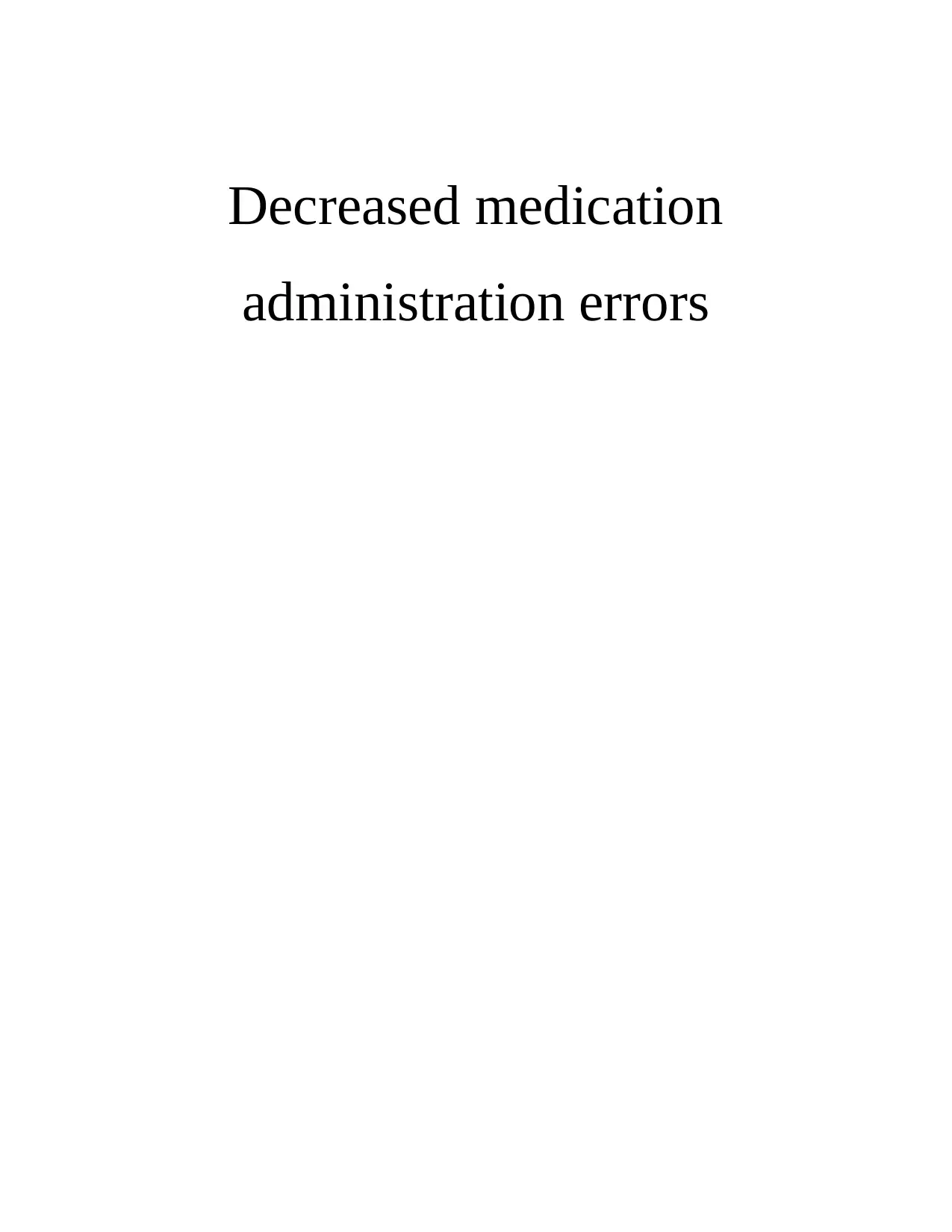
Decreased medication
administration errors
administration errors
Paraphrase This Document
Need a fresh take? Get an instant paraphrase of this document with our AI Paraphraser
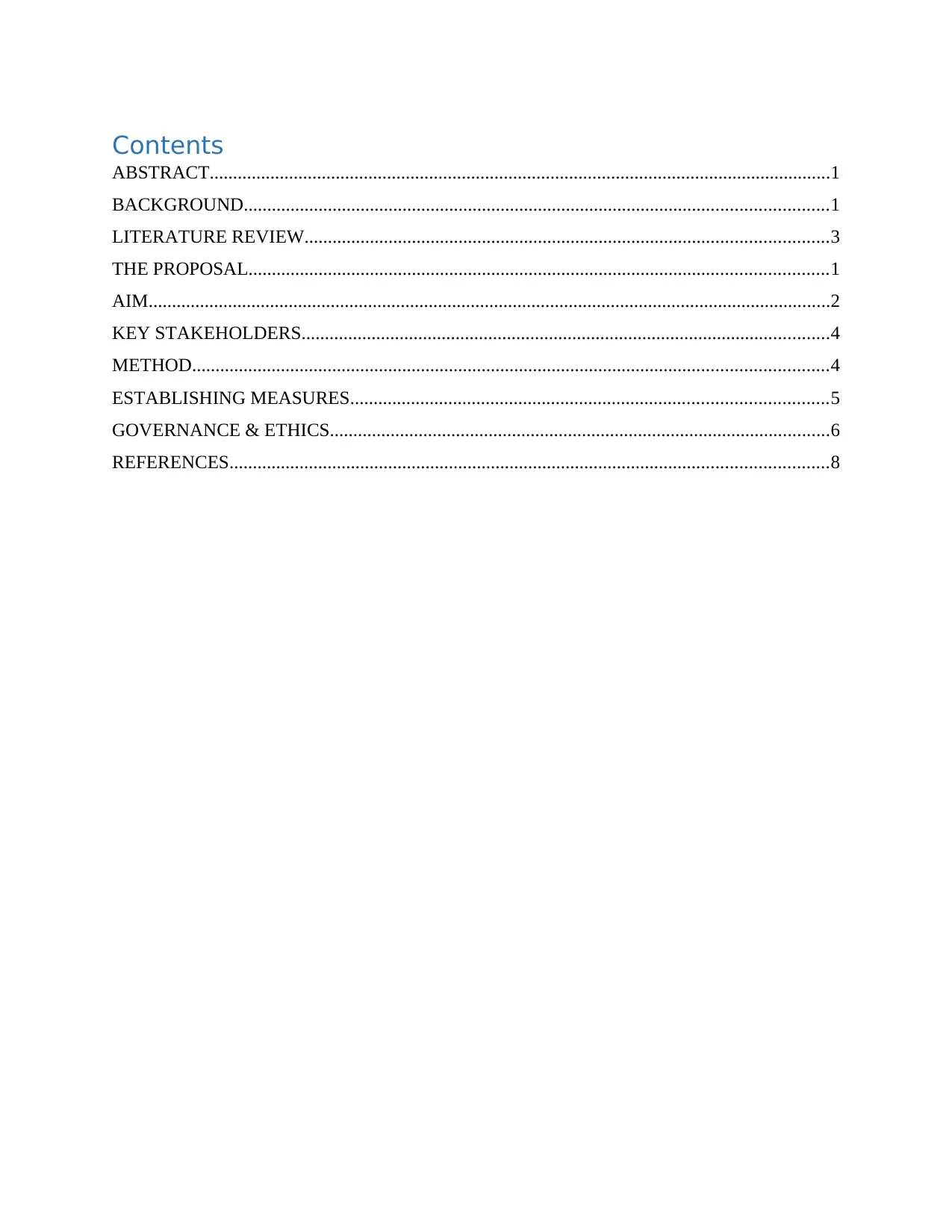
Contents
ABSTRACT.....................................................................................................................................1
BACKGROUND.............................................................................................................................1
LITERATURE REVIEW................................................................................................................3
THE PROPOSAL............................................................................................................................1
AIM..................................................................................................................................................2
KEY STAKEHOLDERS.................................................................................................................4
METHOD........................................................................................................................................4
ESTABLISHING MEASURES......................................................................................................5
GOVERNANCE & ETHICS...........................................................................................................6
REFERENCES................................................................................................................................8
ABSTRACT.....................................................................................................................................1
BACKGROUND.............................................................................................................................1
LITERATURE REVIEW................................................................................................................3
THE PROPOSAL............................................................................................................................1
AIM..................................................................................................................................................2
KEY STAKEHOLDERS.................................................................................................................4
METHOD........................................................................................................................................4
ESTABLISHING MEASURES......................................................................................................5
GOVERNANCE & ETHICS...........................................................................................................6
REFERENCES................................................................................................................................8

⊘ This is a preview!⊘
Do you want full access?
Subscribe today to unlock all pages.

Trusted by 1+ million students worldwide
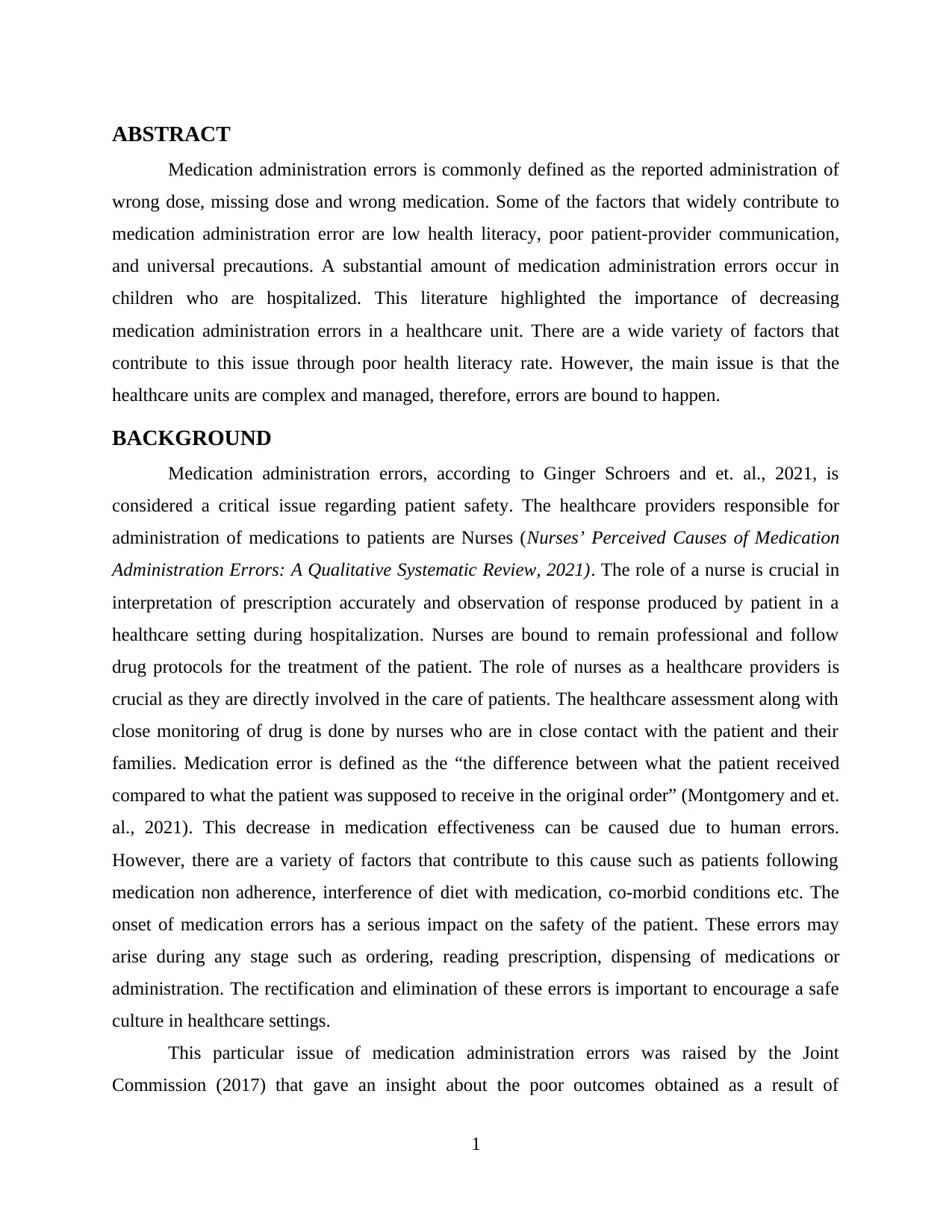
ABSTRACT
Medication administration errors is commonly defined as the reported administration of
wrong dose, missing dose and wrong medication. Some of the factors that widely contribute to
medication administration error are low health literacy, poor patient-provider communication,
and universal precautions. A substantial amount of medication administration errors occur in
children who are hospitalized. This literature highlighted the importance of decreasing
medication administration errors in a healthcare unit. There are a wide variety of factors that
contribute to this issue through poor health literacy rate. However, the main issue is that the
healthcare units are complex and managed, therefore, errors are bound to happen.
BACKGROUND
Medication administration errors, according to Ginger Schroers and et. al., 2021, is
considered a critical issue regarding patient safety. The healthcare providers responsible for
administration of medications to patients are Nurses (Nurses’ Perceived Causes of Medication
Administration Errors: A Qualitative Systematic Review, 2021). The role of a nurse is crucial in
interpretation of prescription accurately and observation of response produced by patient in a
healthcare setting during hospitalization. Nurses are bound to remain professional and follow
drug protocols for the treatment of the patient. The role of nurses as a healthcare providers is
crucial as they are directly involved in the care of patients. The healthcare assessment along with
close monitoring of drug is done by nurses who are in close contact with the patient and their
families. Medication error is defined as the “the difference between what the patient received
compared to what the patient was supposed to receive in the original order” (Montgomery and et.
al., 2021). This decrease in medication effectiveness can be caused due to human errors.
However, there are a variety of factors that contribute to this cause such as patients following
medication non adherence, interference of diet with medication, co-morbid conditions etc. The
onset of medication errors has a serious impact on the safety of the patient. These errors may
arise during any stage such as ordering, reading prescription, dispensing of medications or
administration. The rectification and elimination of these errors is important to encourage a safe
culture in healthcare settings.
This particular issue of medication administration errors was raised by the Joint
Commission (2017) that gave an insight about the poor outcomes obtained as a result of
1
Medication administration errors is commonly defined as the reported administration of
wrong dose, missing dose and wrong medication. Some of the factors that widely contribute to
medication administration error are low health literacy, poor patient-provider communication,
and universal precautions. A substantial amount of medication administration errors occur in
children who are hospitalized. This literature highlighted the importance of decreasing
medication administration errors in a healthcare unit. There are a wide variety of factors that
contribute to this issue through poor health literacy rate. However, the main issue is that the
healthcare units are complex and managed, therefore, errors are bound to happen.
BACKGROUND
Medication administration errors, according to Ginger Schroers and et. al., 2021, is
considered a critical issue regarding patient safety. The healthcare providers responsible for
administration of medications to patients are Nurses (Nurses’ Perceived Causes of Medication
Administration Errors: A Qualitative Systematic Review, 2021). The role of a nurse is crucial in
interpretation of prescription accurately and observation of response produced by patient in a
healthcare setting during hospitalization. Nurses are bound to remain professional and follow
drug protocols for the treatment of the patient. The role of nurses as a healthcare providers is
crucial as they are directly involved in the care of patients. The healthcare assessment along with
close monitoring of drug is done by nurses who are in close contact with the patient and their
families. Medication error is defined as the “the difference between what the patient received
compared to what the patient was supposed to receive in the original order” (Montgomery and et.
al., 2021). This decrease in medication effectiveness can be caused due to human errors.
However, there are a variety of factors that contribute to this cause such as patients following
medication non adherence, interference of diet with medication, co-morbid conditions etc. The
onset of medication errors has a serious impact on the safety of the patient. These errors may
arise during any stage such as ordering, reading prescription, dispensing of medications or
administration. The rectification and elimination of these errors is important to encourage a safe
culture in healthcare settings.
This particular issue of medication administration errors was raised by the Joint
Commission (2017) that gave an insight about the poor outcomes obtained as a result of
1
Paraphrase This Document
Need a fresh take? Get an instant paraphrase of this document with our AI Paraphraser
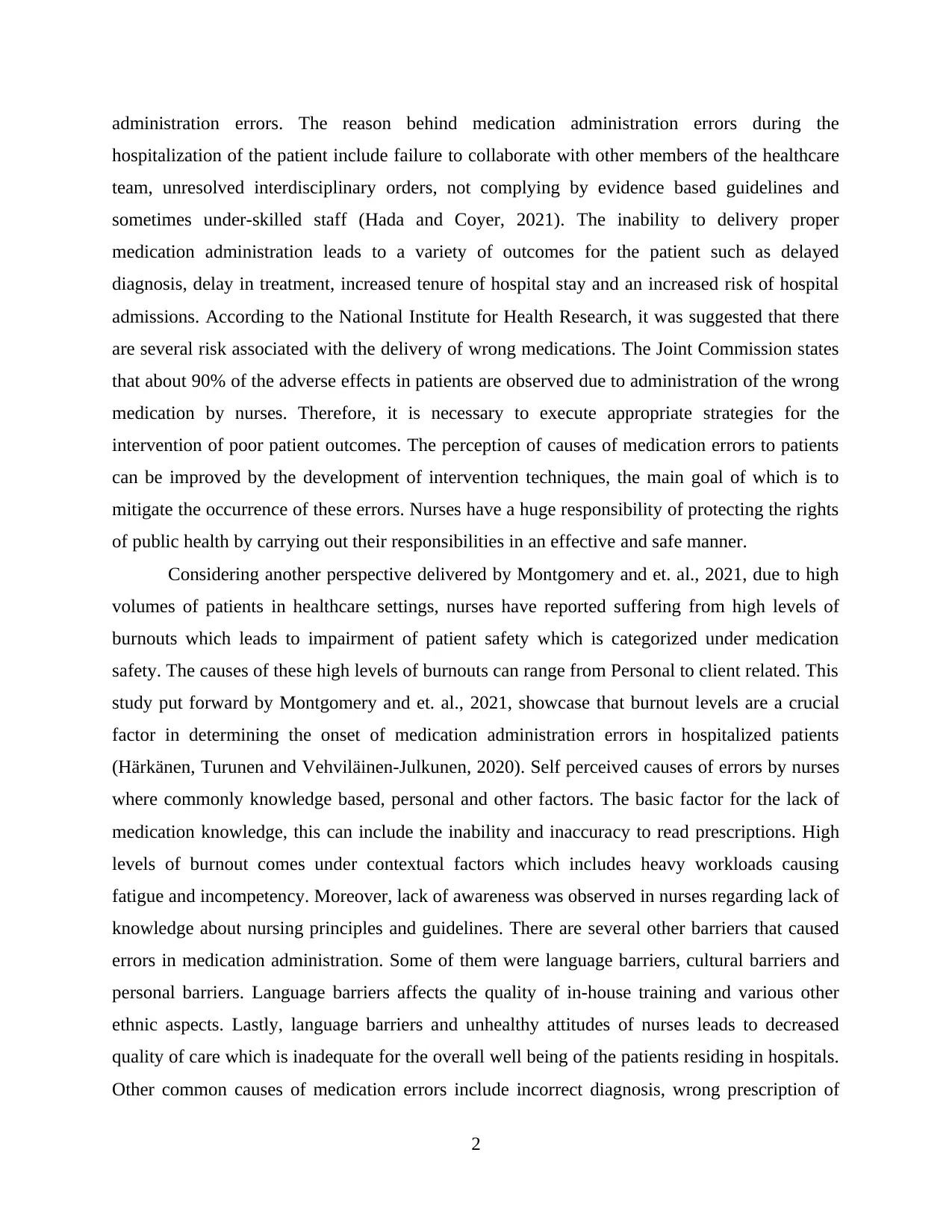
administration errors. The reason behind medication administration errors during the
hospitalization of the patient include failure to collaborate with other members of the healthcare
team, unresolved interdisciplinary orders, not complying by evidence based guidelines and
sometimes under-skilled staff (Hada and Coyer, 2021). The inability to delivery proper
medication administration leads to a variety of outcomes for the patient such as delayed
diagnosis, delay in treatment, increased tenure of hospital stay and an increased risk of hospital
admissions. According to the National Institute for Health Research, it was suggested that there
are several risk associated with the delivery of wrong medications. The Joint Commission states
that about 90% of the adverse effects in patients are observed due to administration of the wrong
medication by nurses. Therefore, it is necessary to execute appropriate strategies for the
intervention of poor patient outcomes. The perception of causes of medication errors to patients
can be improved by the development of intervention techniques, the main goal of which is to
mitigate the occurrence of these errors. Nurses have a huge responsibility of protecting the rights
of public health by carrying out their responsibilities in an effective and safe manner.
Considering another perspective delivered by Montgomery and et. al., 2021, due to high
volumes of patients in healthcare settings, nurses have reported suffering from high levels of
burnouts which leads to impairment of patient safety which is categorized under medication
safety. The causes of these high levels of burnouts can range from Personal to client related. This
study put forward by Montgomery and et. al., 2021, showcase that burnout levels are a crucial
factor in determining the onset of medication administration errors in hospitalized patients
(Härkänen, Turunen and Vehviläinen-Julkunen, 2020). Self perceived causes of errors by nurses
where commonly knowledge based, personal and other factors. The basic factor for the lack of
medication knowledge, this can include the inability and inaccuracy to read prescriptions. High
levels of burnout comes under contextual factors which includes heavy workloads causing
fatigue and incompetency. Moreover, lack of awareness was observed in nurses regarding lack of
knowledge about nursing principles and guidelines. There are several other barriers that caused
errors in medication administration. Some of them were language barriers, cultural barriers and
personal barriers. Language barriers affects the quality of in-house training and various other
ethnic aspects. Lastly, language barriers and unhealthy attitudes of nurses leads to decreased
quality of care which is inadequate for the overall well being of the patients residing in hospitals.
Other common causes of medication errors include incorrect diagnosis, wrong prescription of
2
hospitalization of the patient include failure to collaborate with other members of the healthcare
team, unresolved interdisciplinary orders, not complying by evidence based guidelines and
sometimes under-skilled staff (Hada and Coyer, 2021). The inability to delivery proper
medication administration leads to a variety of outcomes for the patient such as delayed
diagnosis, delay in treatment, increased tenure of hospital stay and an increased risk of hospital
admissions. According to the National Institute for Health Research, it was suggested that there
are several risk associated with the delivery of wrong medications. The Joint Commission states
that about 90% of the adverse effects in patients are observed due to administration of the wrong
medication by nurses. Therefore, it is necessary to execute appropriate strategies for the
intervention of poor patient outcomes. The perception of causes of medication errors to patients
can be improved by the development of intervention techniques, the main goal of which is to
mitigate the occurrence of these errors. Nurses have a huge responsibility of protecting the rights
of public health by carrying out their responsibilities in an effective and safe manner.
Considering another perspective delivered by Montgomery and et. al., 2021, due to high
volumes of patients in healthcare settings, nurses have reported suffering from high levels of
burnouts which leads to impairment of patient safety which is categorized under medication
safety. The causes of these high levels of burnouts can range from Personal to client related. This
study put forward by Montgomery and et. al., 2021, showcase that burnout levels are a crucial
factor in determining the onset of medication administration errors in hospitalized patients
(Härkänen, Turunen and Vehviläinen-Julkunen, 2020). Self perceived causes of errors by nurses
where commonly knowledge based, personal and other factors. The basic factor for the lack of
medication knowledge, this can include the inability and inaccuracy to read prescriptions. High
levels of burnout comes under contextual factors which includes heavy workloads causing
fatigue and incompetency. Moreover, lack of awareness was observed in nurses regarding lack of
knowledge about nursing principles and guidelines. There are several other barriers that caused
errors in medication administration. Some of them were language barriers, cultural barriers and
personal barriers. Language barriers affects the quality of in-house training and various other
ethnic aspects. Lastly, language barriers and unhealthy attitudes of nurses leads to decreased
quality of care which is inadequate for the overall well being of the patients residing in hospitals.
Other common causes of medication errors include incorrect diagnosis, wrong prescription of
2
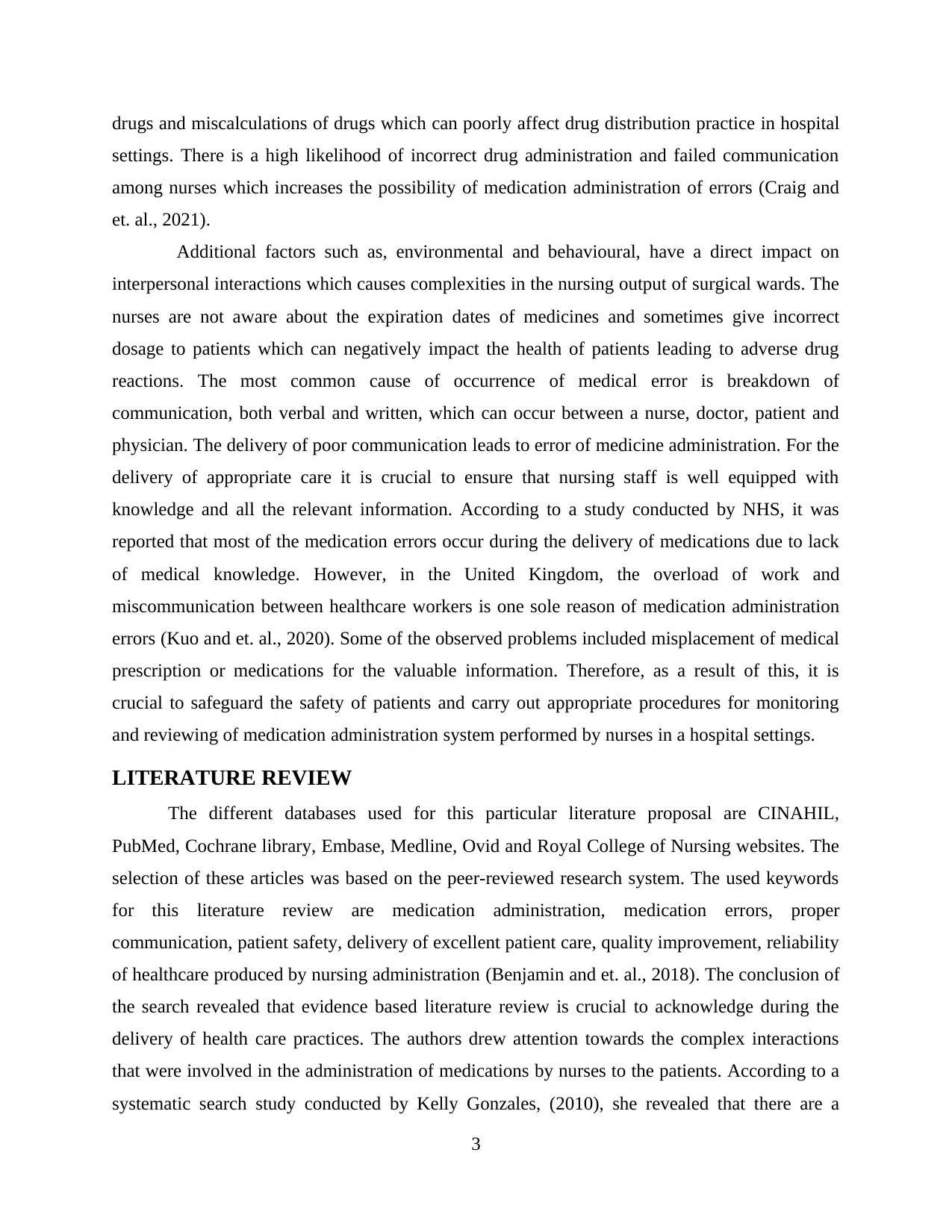
drugs and miscalculations of drugs which can poorly affect drug distribution practice in hospital
settings. There is a high likelihood of incorrect drug administration and failed communication
among nurses which increases the possibility of medication administration of errors (Craig and
et. al., 2021).
Additional factors such as, environmental and behavioural, have a direct impact on
interpersonal interactions which causes complexities in the nursing output of surgical wards. The
nurses are not aware about the expiration dates of medicines and sometimes give incorrect
dosage to patients which can negatively impact the health of patients leading to adverse drug
reactions. The most common cause of occurrence of medical error is breakdown of
communication, both verbal and written, which can occur between a nurse, doctor, patient and
physician. The delivery of poor communication leads to error of medicine administration. For the
delivery of appropriate care it is crucial to ensure that nursing staff is well equipped with
knowledge and all the relevant information. According to a study conducted by NHS, it was
reported that most of the medication errors occur during the delivery of medications due to lack
of medical knowledge. However, in the United Kingdom, the overload of work and
miscommunication between healthcare workers is one sole reason of medication administration
errors (Kuo and et. al., 2020). Some of the observed problems included misplacement of medical
prescription or medications for the valuable information. Therefore, as a result of this, it is
crucial to safeguard the safety of patients and carry out appropriate procedures for monitoring
and reviewing of medication administration system performed by nurses in a hospital settings.
LITERATURE REVIEW
The different databases used for this particular literature proposal are CINAHIL,
PubMed, Cochrane library, Embase, Medline, Ovid and Royal College of Nursing websites. The
selection of these articles was based on the peer-reviewed research system. The used keywords
for this literature review are medication administration, medication errors, proper
communication, patient safety, delivery of excellent patient care, quality improvement, reliability
of healthcare produced by nursing administration (Benjamin and et. al., 2018). The conclusion of
the search revealed that evidence based literature review is crucial to acknowledge during the
delivery of health care practices. The authors drew attention towards the complex interactions
that were involved in the administration of medications by nurses to the patients. According to a
systematic search study conducted by Kelly Gonzales, (2010), she revealed that there are a
3
settings. There is a high likelihood of incorrect drug administration and failed communication
among nurses which increases the possibility of medication administration of errors (Craig and
et. al., 2021).
Additional factors such as, environmental and behavioural, have a direct impact on
interpersonal interactions which causes complexities in the nursing output of surgical wards. The
nurses are not aware about the expiration dates of medicines and sometimes give incorrect
dosage to patients which can negatively impact the health of patients leading to adverse drug
reactions. The most common cause of occurrence of medical error is breakdown of
communication, both verbal and written, which can occur between a nurse, doctor, patient and
physician. The delivery of poor communication leads to error of medicine administration. For the
delivery of appropriate care it is crucial to ensure that nursing staff is well equipped with
knowledge and all the relevant information. According to a study conducted by NHS, it was
reported that most of the medication errors occur during the delivery of medications due to lack
of medical knowledge. However, in the United Kingdom, the overload of work and
miscommunication between healthcare workers is one sole reason of medication administration
errors (Kuo and et. al., 2020). Some of the observed problems included misplacement of medical
prescription or medications for the valuable information. Therefore, as a result of this, it is
crucial to safeguard the safety of patients and carry out appropriate procedures for monitoring
and reviewing of medication administration system performed by nurses in a hospital settings.
LITERATURE REVIEW
The different databases used for this particular literature proposal are CINAHIL,
PubMed, Cochrane library, Embase, Medline, Ovid and Royal College of Nursing websites. The
selection of these articles was based on the peer-reviewed research system. The used keywords
for this literature review are medication administration, medication errors, proper
communication, patient safety, delivery of excellent patient care, quality improvement, reliability
of healthcare produced by nursing administration (Benjamin and et. al., 2018). The conclusion of
the search revealed that evidence based literature review is crucial to acknowledge during the
delivery of health care practices. The authors drew attention towards the complex interactions
that were involved in the administration of medications by nurses to the patients. According to a
systematic search study conducted by Kelly Gonzales, (2010), she revealed that there are a
3
⊘ This is a preview!⊘
Do you want full access?
Subscribe today to unlock all pages.

Trusted by 1+ million students worldwide
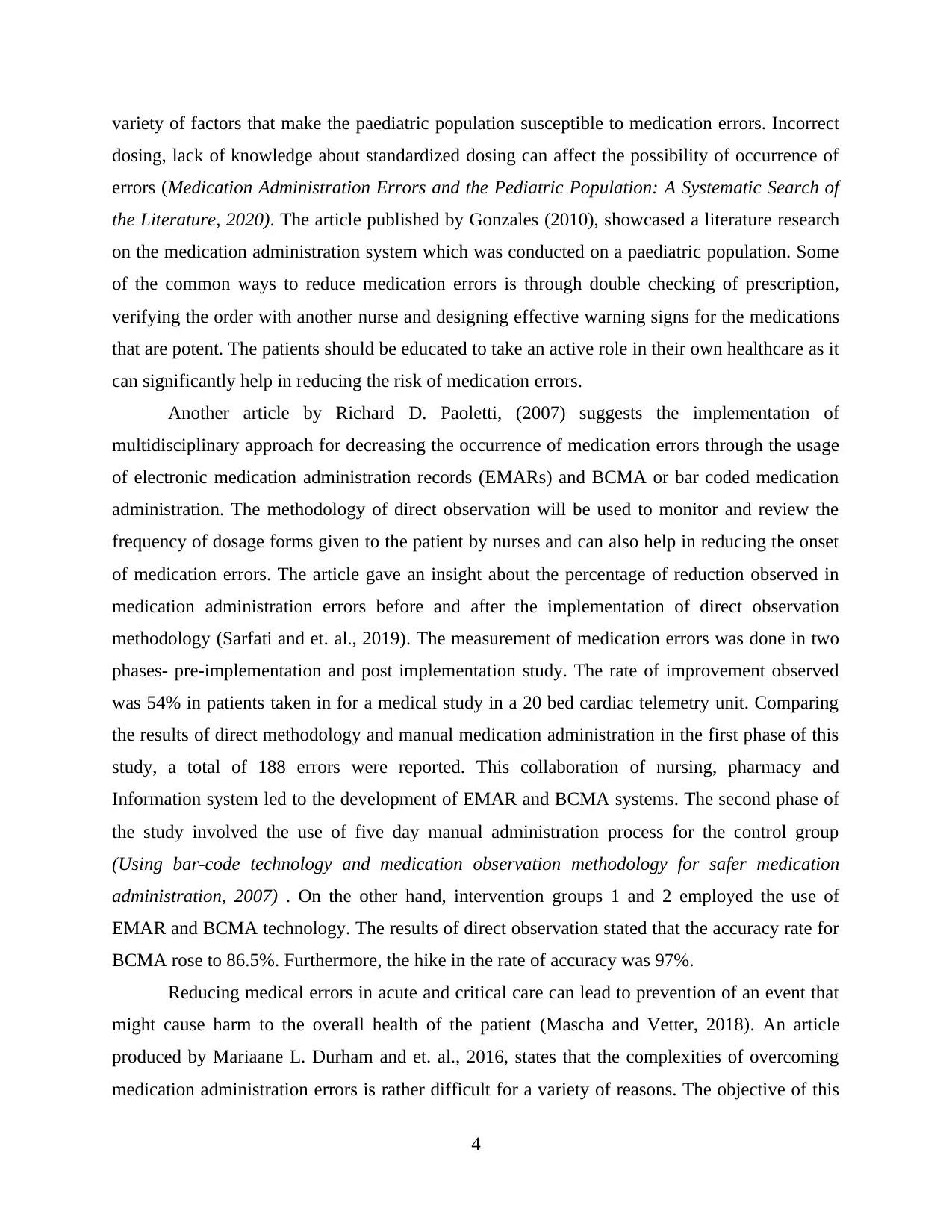
variety of factors that make the paediatric population susceptible to medication errors. Incorrect
dosing, lack of knowledge about standardized dosing can affect the possibility of occurrence of
errors (Medication Administration Errors and the Pediatric Population: A Systematic Search of
the Literature, 2020). The article published by Gonzales (2010), showcased a literature research
on the medication administration system which was conducted on a paediatric population. Some
of the common ways to reduce medication errors is through double checking of prescription,
verifying the order with another nurse and designing effective warning signs for the medications
that are potent. The patients should be educated to take an active role in their own healthcare as it
can significantly help in reducing the risk of medication errors.
Another article by Richard D. Paoletti, (2007) suggests the implementation of
multidisciplinary approach for decreasing the occurrence of medication errors through the usage
of electronic medication administration records (EMARs) and BCMA or bar coded medication
administration. The methodology of direct observation will be used to monitor and review the
frequency of dosage forms given to the patient by nurses and can also help in reducing the onset
of medication errors. The article gave an insight about the percentage of reduction observed in
medication administration errors before and after the implementation of direct observation
methodology (Sarfati and et. al., 2019). The measurement of medication errors was done in two
phases- pre-implementation and post implementation study. The rate of improvement observed
was 54% in patients taken in for a medical study in a 20 bed cardiac telemetry unit. Comparing
the results of direct methodology and manual medication administration in the first phase of this
study, a total of 188 errors were reported. This collaboration of nursing, pharmacy and
Information system led to the development of EMAR and BCMA systems. The second phase of
the study involved the use of five day manual administration process for the control group
(Using bar-code technology and medication observation methodology for safer medication
administration, 2007) . On the other hand, intervention groups 1 and 2 employed the use of
EMAR and BCMA technology. The results of direct observation stated that the accuracy rate for
BCMA rose to 86.5%. Furthermore, the hike in the rate of accuracy was 97%.
Reducing medical errors in acute and critical care can lead to prevention of an event that
might cause harm to the overall health of the patient (Mascha and Vetter, 2018). An article
produced by Mariaane L. Durham and et. al., 2016, states that the complexities of overcoming
medication administration errors is rather difficult for a variety of reasons. The objective of this
4
dosing, lack of knowledge about standardized dosing can affect the possibility of occurrence of
errors (Medication Administration Errors and the Pediatric Population: A Systematic Search of
the Literature, 2020). The article published by Gonzales (2010), showcased a literature research
on the medication administration system which was conducted on a paediatric population. Some
of the common ways to reduce medication errors is through double checking of prescription,
verifying the order with another nurse and designing effective warning signs for the medications
that are potent. The patients should be educated to take an active role in their own healthcare as it
can significantly help in reducing the risk of medication errors.
Another article by Richard D. Paoletti, (2007) suggests the implementation of
multidisciplinary approach for decreasing the occurrence of medication errors through the usage
of electronic medication administration records (EMARs) and BCMA or bar coded medication
administration. The methodology of direct observation will be used to monitor and review the
frequency of dosage forms given to the patient by nurses and can also help in reducing the onset
of medication errors. The article gave an insight about the percentage of reduction observed in
medication administration errors before and after the implementation of direct observation
methodology (Sarfati and et. al., 2019). The measurement of medication errors was done in two
phases- pre-implementation and post implementation study. The rate of improvement observed
was 54% in patients taken in for a medical study in a 20 bed cardiac telemetry unit. Comparing
the results of direct methodology and manual medication administration in the first phase of this
study, a total of 188 errors were reported. This collaboration of nursing, pharmacy and
Information system led to the development of EMAR and BCMA systems. The second phase of
the study involved the use of five day manual administration process for the control group
(Using bar-code technology and medication observation methodology for safer medication
administration, 2007) . On the other hand, intervention groups 1 and 2 employed the use of
EMAR and BCMA technology. The results of direct observation stated that the accuracy rate for
BCMA rose to 86.5%. Furthermore, the hike in the rate of accuracy was 97%.
Reducing medical errors in acute and critical care can lead to prevention of an event that
might cause harm to the overall health of the patient (Mascha and Vetter, 2018). An article
produced by Mariaane L. Durham and et. al., 2016, states that the complexities of overcoming
medication administration errors is rather difficult for a variety of reasons. The objective of this
4
Paraphrase This Document
Need a fresh take? Get an instant paraphrase of this document with our AI Paraphraser
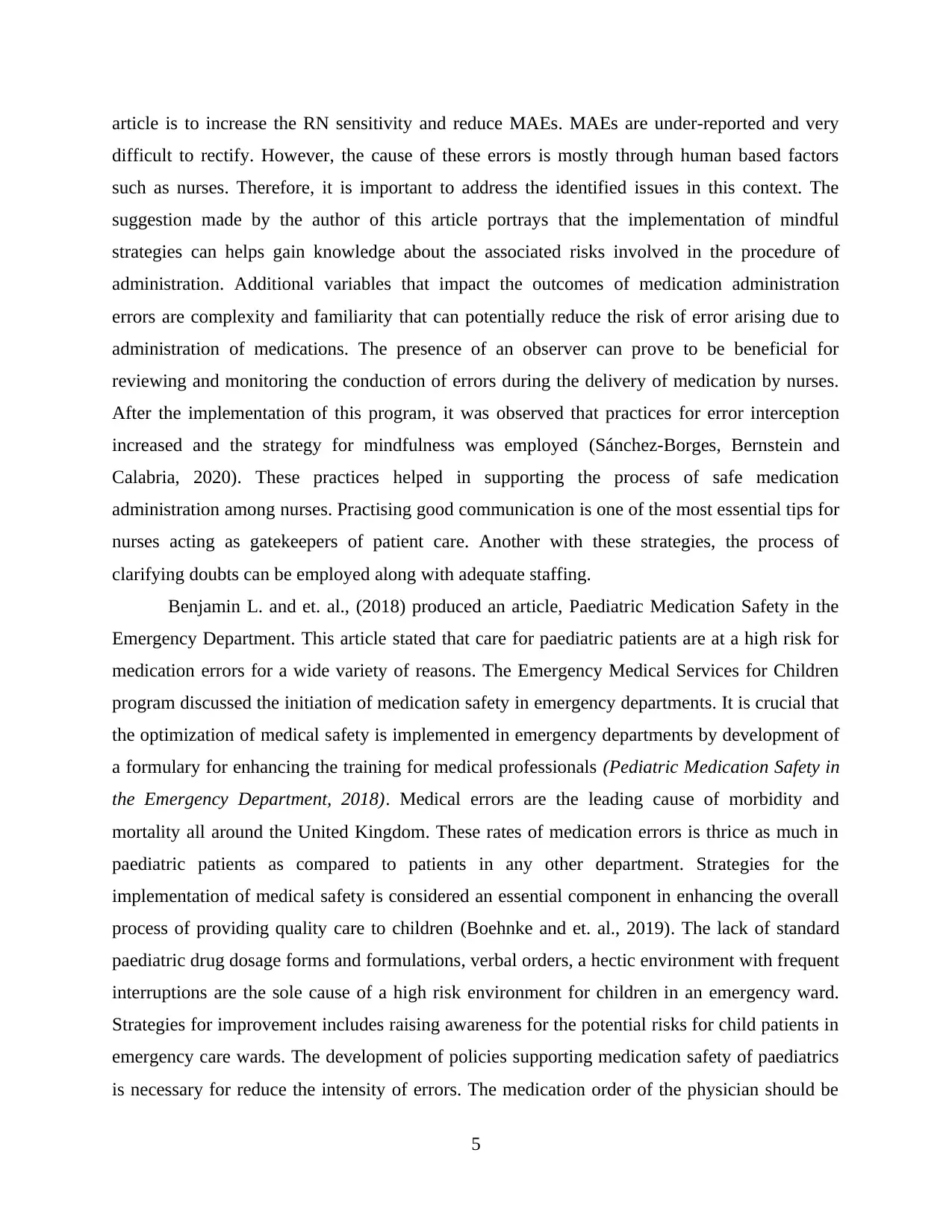
article is to increase the RN sensitivity and reduce MAEs. MAEs are under-reported and very
difficult to rectify. However, the cause of these errors is mostly through human based factors
such as nurses. Therefore, it is important to address the identified issues in this context. The
suggestion made by the author of this article portrays that the implementation of mindful
strategies can helps gain knowledge about the associated risks involved in the procedure of
administration. Additional variables that impact the outcomes of medication administration
errors are complexity and familiarity that can potentially reduce the risk of error arising due to
administration of medications. The presence of an observer can prove to be beneficial for
reviewing and monitoring the conduction of errors during the delivery of medication by nurses.
After the implementation of this program, it was observed that practices for error interception
increased and the strategy for mindfulness was employed (Sánchez-Borges, Bernstein and
Calabria, 2020). These practices helped in supporting the process of safe medication
administration among nurses. Practising good communication is one of the most essential tips for
nurses acting as gatekeepers of patient care. Another with these strategies, the process of
clarifying doubts can be employed along with adequate staffing.
Benjamin L. and et. al., (2018) produced an article, Paediatric Medication Safety in the
Emergency Department. This article stated that care for paediatric patients are at a high risk for
medication errors for a wide variety of reasons. The Emergency Medical Services for Children
program discussed the initiation of medication safety in emergency departments. It is crucial that
the optimization of medical safety is implemented in emergency departments by development of
a formulary for enhancing the training for medical professionals (Pediatric Medication Safety in
the Emergency Department, 2018). Medical errors are the leading cause of morbidity and
mortality all around the United Kingdom. These rates of medication errors is thrice as much in
paediatric patients as compared to patients in any other department. Strategies for the
implementation of medical safety is considered an essential component in enhancing the overall
process of providing quality care to children (Boehnke and et. al., 2019). The lack of standard
paediatric drug dosage forms and formulations, verbal orders, a hectic environment with frequent
interruptions are the sole cause of a high risk environment for children in an emergency ward.
Strategies for improvement includes raising awareness for the potential risks for child patients in
emergency care wards. The development of policies supporting medication safety of paediatrics
is necessary for reduce the intensity of errors. The medication order of the physician should be
5
difficult to rectify. However, the cause of these errors is mostly through human based factors
such as nurses. Therefore, it is important to address the identified issues in this context. The
suggestion made by the author of this article portrays that the implementation of mindful
strategies can helps gain knowledge about the associated risks involved in the procedure of
administration. Additional variables that impact the outcomes of medication administration
errors are complexity and familiarity that can potentially reduce the risk of error arising due to
administration of medications. The presence of an observer can prove to be beneficial for
reviewing and monitoring the conduction of errors during the delivery of medication by nurses.
After the implementation of this program, it was observed that practices for error interception
increased and the strategy for mindfulness was employed (Sánchez-Borges, Bernstein and
Calabria, 2020). These practices helped in supporting the process of safe medication
administration among nurses. Practising good communication is one of the most essential tips for
nurses acting as gatekeepers of patient care. Another with these strategies, the process of
clarifying doubts can be employed along with adequate staffing.
Benjamin L. and et. al., (2018) produced an article, Paediatric Medication Safety in the
Emergency Department. This article stated that care for paediatric patients are at a high risk for
medication errors for a wide variety of reasons. The Emergency Medical Services for Children
program discussed the initiation of medication safety in emergency departments. It is crucial that
the optimization of medical safety is implemented in emergency departments by development of
a formulary for enhancing the training for medical professionals (Pediatric Medication Safety in
the Emergency Department, 2018). Medical errors are the leading cause of morbidity and
mortality all around the United Kingdom. These rates of medication errors is thrice as much in
paediatric patients as compared to patients in any other department. Strategies for the
implementation of medical safety is considered an essential component in enhancing the overall
process of providing quality care to children (Boehnke and et. al., 2019). The lack of standard
paediatric drug dosage forms and formulations, verbal orders, a hectic environment with frequent
interruptions are the sole cause of a high risk environment for children in an emergency ward.
Strategies for improvement includes raising awareness for the potential risks for child patients in
emergency care wards. The development of policies supporting medication safety of paediatrics
is necessary for reduce the intensity of errors. The medication order of the physician should be
5
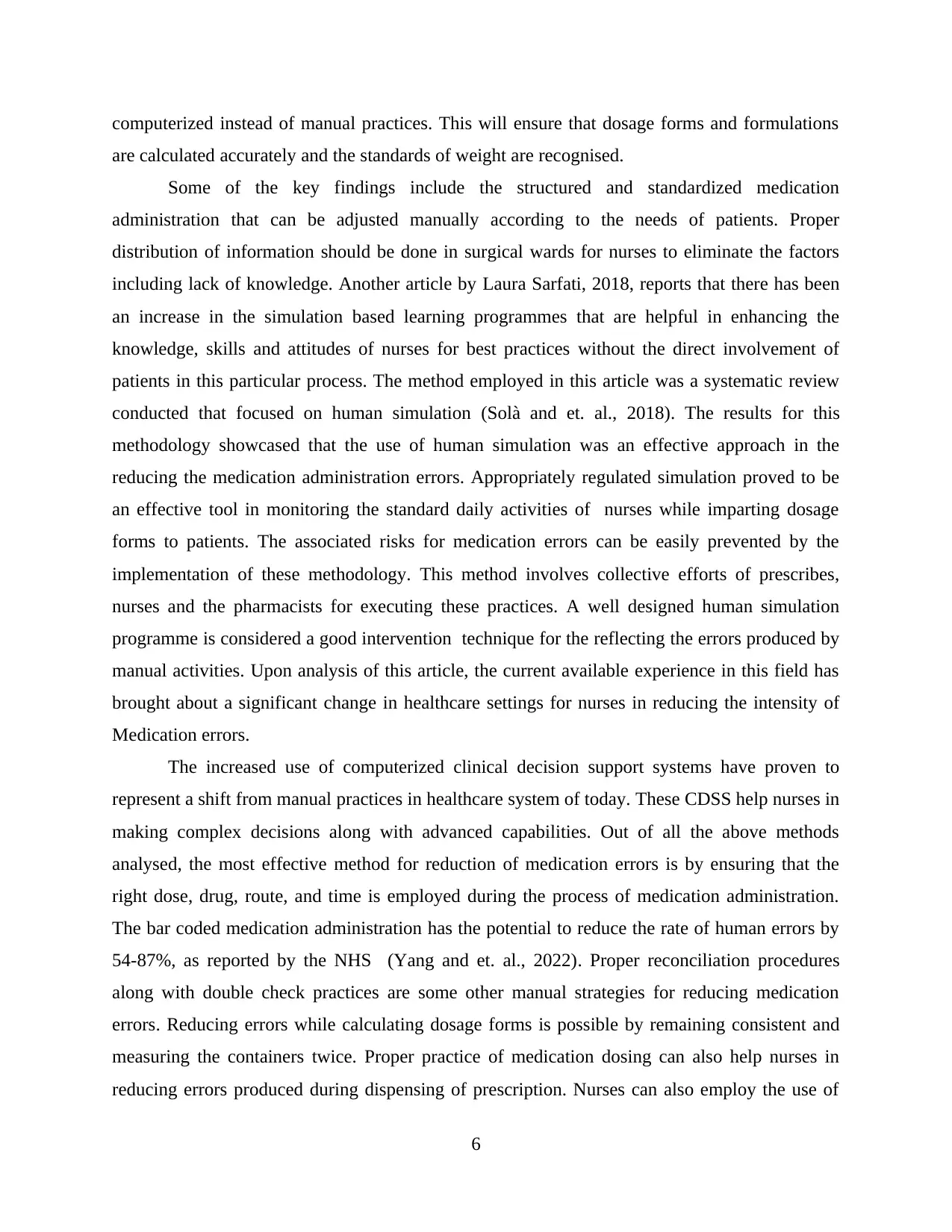
computerized instead of manual practices. This will ensure that dosage forms and formulations
are calculated accurately and the standards of weight are recognised.
Some of the key findings include the structured and standardized medication
administration that can be adjusted manually according to the needs of patients. Proper
distribution of information should be done in surgical wards for nurses to eliminate the factors
including lack of knowledge. Another article by Laura Sarfati, 2018, reports that there has been
an increase in the simulation based learning programmes that are helpful in enhancing the
knowledge, skills and attitudes of nurses for best practices without the direct involvement of
patients in this particular process. The method employed in this article was a systematic review
conducted that focused on human simulation (Solà and et. al., 2018). The results for this
methodology showcased that the use of human simulation was an effective approach in the
reducing the medication administration errors. Appropriately regulated simulation proved to be
an effective tool in monitoring the standard daily activities of nurses while imparting dosage
forms to patients. The associated risks for medication errors can be easily prevented by the
implementation of these methodology. This method involves collective efforts of prescribes,
nurses and the pharmacists for executing these practices. A well designed human simulation
programme is considered a good intervention technique for the reflecting the errors produced by
manual activities. Upon analysis of this article, the current available experience in this field has
brought about a significant change in healthcare settings for nurses in reducing the intensity of
Medication errors.
The increased use of computerized clinical decision support systems have proven to
represent a shift from manual practices in healthcare system of today. These CDSS help nurses in
making complex decisions along with advanced capabilities. Out of all the above methods
analysed, the most effective method for reduction of medication errors is by ensuring that the
right dose, drug, route, and time is employed during the process of medication administration.
The bar coded medication administration has the potential to reduce the rate of human errors by
54-87%, as reported by the NHS (Yang and et. al., 2022). Proper reconciliation procedures
along with double check practices are some other manual strategies for reducing medication
errors. Reducing errors while calculating dosage forms is possible by remaining consistent and
measuring the containers twice. Proper practice of medication dosing can also help nurses in
reducing errors produced during dispensing of prescription. Nurses can also employ the use of
6
are calculated accurately and the standards of weight are recognised.
Some of the key findings include the structured and standardized medication
administration that can be adjusted manually according to the needs of patients. Proper
distribution of information should be done in surgical wards for nurses to eliminate the factors
including lack of knowledge. Another article by Laura Sarfati, 2018, reports that there has been
an increase in the simulation based learning programmes that are helpful in enhancing the
knowledge, skills and attitudes of nurses for best practices without the direct involvement of
patients in this particular process. The method employed in this article was a systematic review
conducted that focused on human simulation (Solà and et. al., 2018). The results for this
methodology showcased that the use of human simulation was an effective approach in the
reducing the medication administration errors. Appropriately regulated simulation proved to be
an effective tool in monitoring the standard daily activities of nurses while imparting dosage
forms to patients. The associated risks for medication errors can be easily prevented by the
implementation of these methodology. This method involves collective efforts of prescribes,
nurses and the pharmacists for executing these practices. A well designed human simulation
programme is considered a good intervention technique for the reflecting the errors produced by
manual activities. Upon analysis of this article, the current available experience in this field has
brought about a significant change in healthcare settings for nurses in reducing the intensity of
Medication errors.
The increased use of computerized clinical decision support systems have proven to
represent a shift from manual practices in healthcare system of today. These CDSS help nurses in
making complex decisions along with advanced capabilities. Out of all the above methods
analysed, the most effective method for reduction of medication errors is by ensuring that the
right dose, drug, route, and time is employed during the process of medication administration.
The bar coded medication administration has the potential to reduce the rate of human errors by
54-87%, as reported by the NHS (Yang and et. al., 2022). Proper reconciliation procedures
along with double check practices are some other manual strategies for reducing medication
errors. Reducing errors while calculating dosage forms is possible by remaining consistent and
measuring the containers twice. Proper practice of medication dosing can also help nurses in
reducing errors produced during dispensing of prescription. Nurses can also employ the use of
6
⊘ This is a preview!⊘
Do you want full access?
Subscribe today to unlock all pages.

Trusted by 1+ million students worldwide
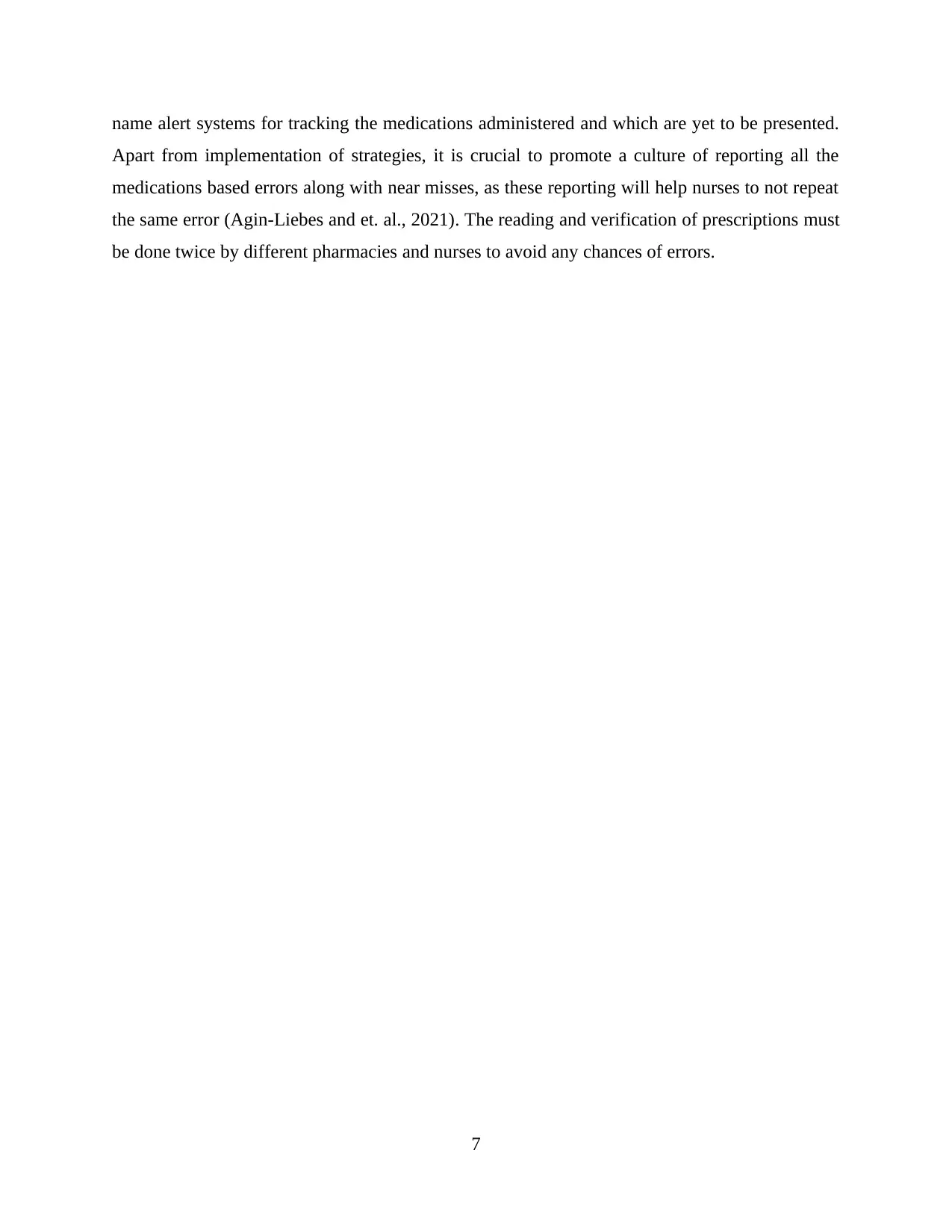
name alert systems for tracking the medications administered and which are yet to be presented.
Apart from implementation of strategies, it is crucial to promote a culture of reporting all the
medications based errors along with near misses, as these reporting will help nurses to not repeat
the same error (Agin-Liebes and et. al., 2021). The reading and verification of prescriptions must
be done twice by different pharmacies and nurses to avoid any chances of errors.
7
Apart from implementation of strategies, it is crucial to promote a culture of reporting all the
medications based errors along with near misses, as these reporting will help nurses to not repeat
the same error (Agin-Liebes and et. al., 2021). The reading and verification of prescriptions must
be done twice by different pharmacies and nurses to avoid any chances of errors.
7
Paraphrase This Document
Need a fresh take? Get an instant paraphrase of this document with our AI Paraphraser
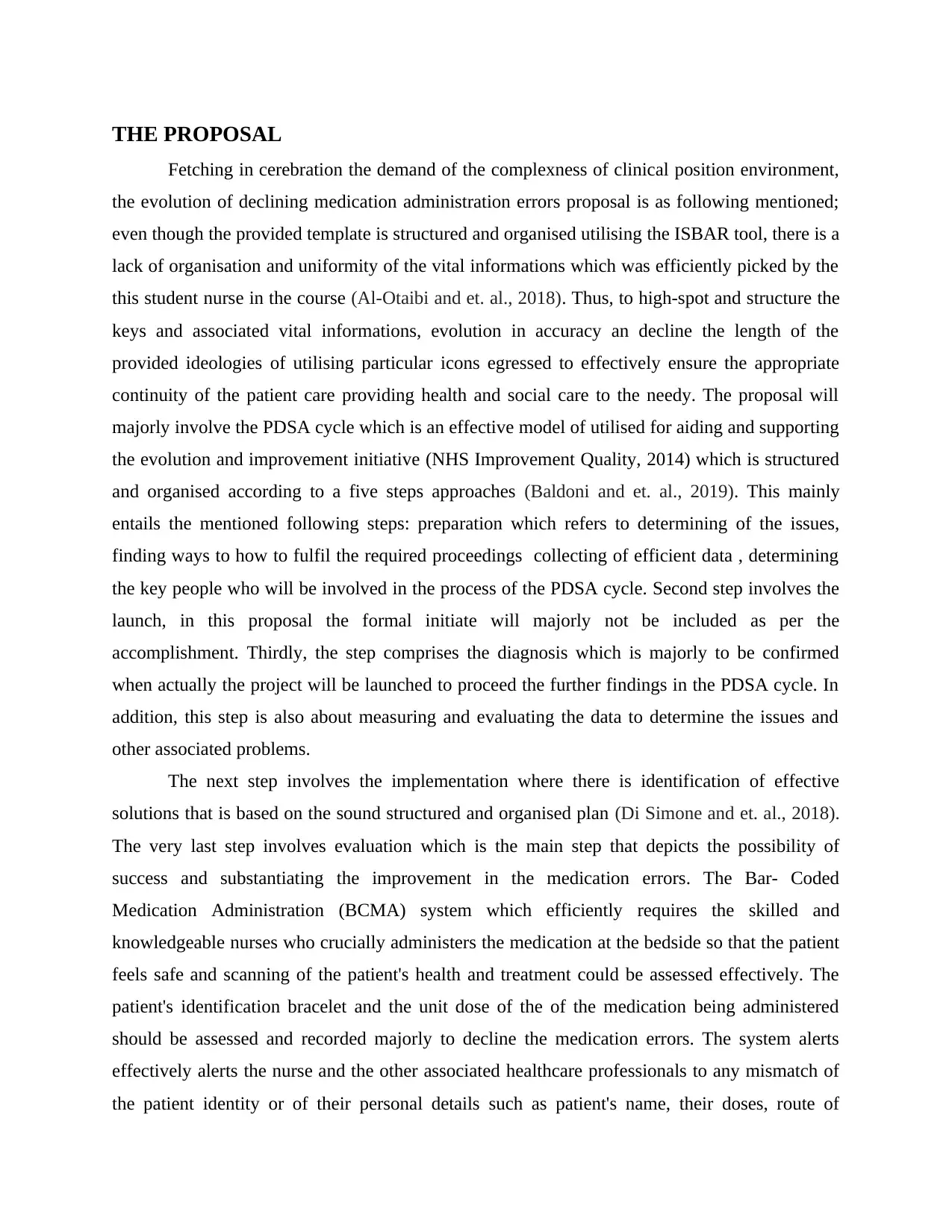
THE PROPOSAL
Fetching in cerebration the demand of the complexness of clinical position environment,
the evolution of declining medication administration errors proposal is as following mentioned;
even though the provided template is structured and organised utilising the ISBAR tool, there is a
lack of organisation and uniformity of the vital informations which was efficiently picked by the
this student nurse in the course (Al-Otaibi and et. al., 2018). Thus, to high-spot and structure the
keys and associated vital informations, evolution in accuracy an decline the length of the
provided ideologies of utilising particular icons egressed to effectively ensure the appropriate
continuity of the patient care providing health and social care to the needy. The proposal will
majorly involve the PDSA cycle which is an effective model of utilised for aiding and supporting
the evolution and improvement initiative (NHS Improvement Quality, 2014) which is structured
and organised according to a five steps approaches (Baldoni and et. al., 2019). This mainly
entails the mentioned following steps: preparation which refers to determining of the issues,
finding ways to how to fulfil the required proceedings collecting of efficient data , determining
the key people who will be involved in the process of the PDSA cycle. Second step involves the
launch, in this proposal the formal initiate will majorly not be included as per the
accomplishment. Thirdly, the step comprises the diagnosis which is majorly to be confirmed
when actually the project will be launched to proceed the further findings in the PDSA cycle. In
addition, this step is also about measuring and evaluating the data to determine the issues and
other associated problems.
The next step involves the implementation where there is identification of effective
solutions that is based on the sound structured and organised plan (Di Simone and et. al., 2018).
The very last step involves evaluation which is the main step that depicts the possibility of
success and substantiating the improvement in the medication errors. The Bar- Coded
Medication Administration (BCMA) system which efficiently requires the skilled and
knowledgeable nurses who crucially administers the medication at the bedside so that the patient
feels safe and scanning of the patient's health and treatment could be assessed effectively. The
patient's identification bracelet and the unit dose of the of the medication being administered
should be assessed and recorded majorly to decline the medication errors. The system alerts
effectively alerts the nurse and the other associated healthcare professionals to any mismatch of
the patient identity or of their personal details such as patient's name, their doses, route of
Fetching in cerebration the demand of the complexness of clinical position environment,
the evolution of declining medication administration errors proposal is as following mentioned;
even though the provided template is structured and organised utilising the ISBAR tool, there is a
lack of organisation and uniformity of the vital informations which was efficiently picked by the
this student nurse in the course (Al-Otaibi and et. al., 2018). Thus, to high-spot and structure the
keys and associated vital informations, evolution in accuracy an decline the length of the
provided ideologies of utilising particular icons egressed to effectively ensure the appropriate
continuity of the patient care providing health and social care to the needy. The proposal will
majorly involve the PDSA cycle which is an effective model of utilised for aiding and supporting
the evolution and improvement initiative (NHS Improvement Quality, 2014) which is structured
and organised according to a five steps approaches (Baldoni and et. al., 2019). This mainly
entails the mentioned following steps: preparation which refers to determining of the issues,
finding ways to how to fulfil the required proceedings collecting of efficient data , determining
the key people who will be involved in the process of the PDSA cycle. Second step involves the
launch, in this proposal the formal initiate will majorly not be included as per the
accomplishment. Thirdly, the step comprises the diagnosis which is majorly to be confirmed
when actually the project will be launched to proceed the further findings in the PDSA cycle. In
addition, this step is also about measuring and evaluating the data to determine the issues and
other associated problems.
The next step involves the implementation where there is identification of effective
solutions that is based on the sound structured and organised plan (Di Simone and et. al., 2018).
The very last step involves evaluation which is the main step that depicts the possibility of
success and substantiating the improvement in the medication errors. The Bar- Coded
Medication Administration (BCMA) system which efficiently requires the skilled and
knowledgeable nurses who crucially administers the medication at the bedside so that the patient
feels safe and scanning of the patient's health and treatment could be assessed effectively. The
patient's identification bracelet and the unit dose of the of the medication being administered
should be assessed and recorded majorly to decline the medication errors. The system alerts
effectively alerts the nurse and the other associated healthcare professionals to any mismatch of
the patient identity or of their personal details such as patient's name, their doses, route of
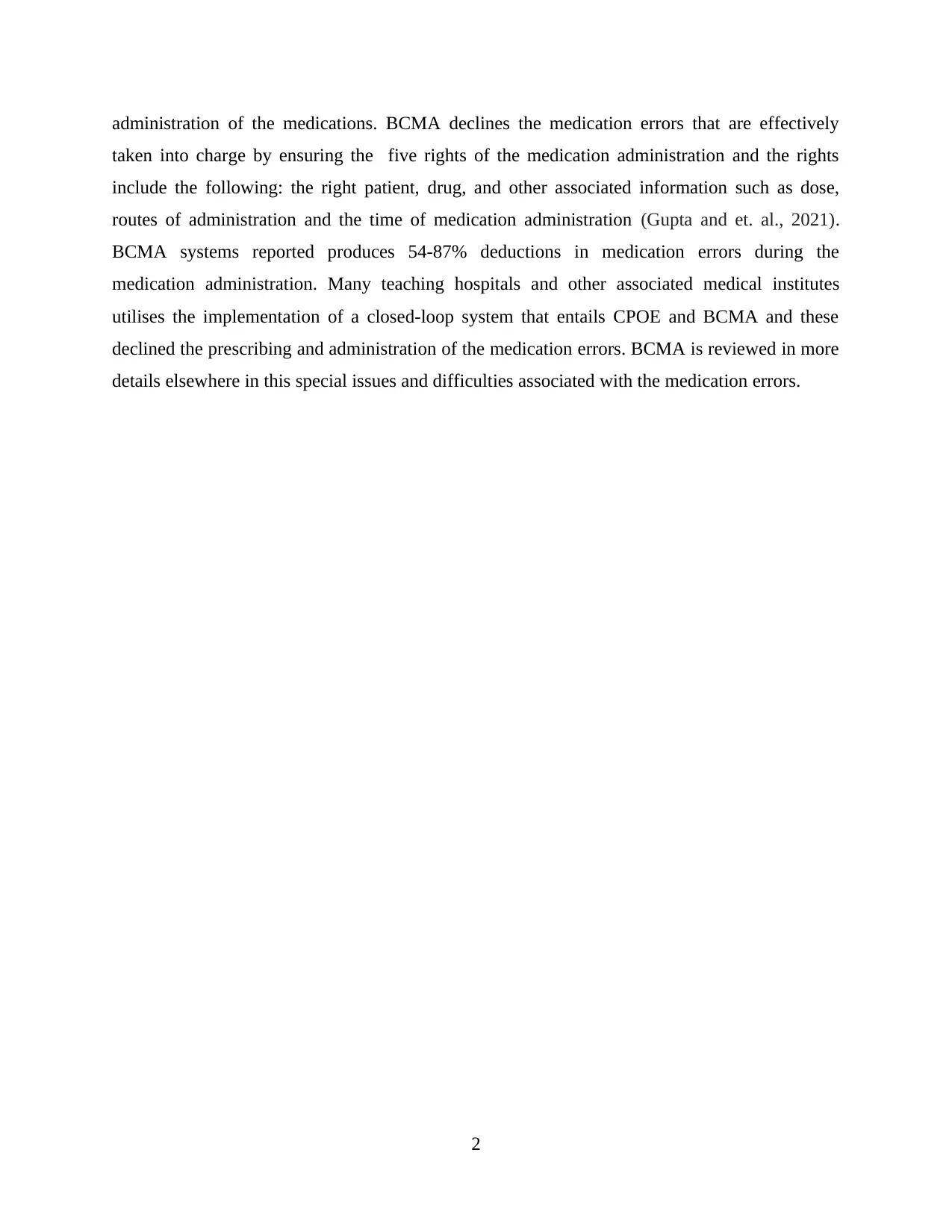
administration of the medications. BCMA declines the medication errors that are effectively
taken into charge by ensuring the five rights of the medication administration and the rights
include the following: the right patient, drug, and other associated information such as dose,
routes of administration and the time of medication administration (Gupta and et. al., 2021).
BCMA systems reported produces 54-87% deductions in medication errors during the
medication administration. Many teaching hospitals and other associated medical institutes
utilises the implementation of a closed-loop system that entails CPOE and BCMA and these
declined the prescribing and administration of the medication errors. BCMA is reviewed in more
details elsewhere in this special issues and difficulties associated with the medication errors.
2
taken into charge by ensuring the five rights of the medication administration and the rights
include the following: the right patient, drug, and other associated information such as dose,
routes of administration and the time of medication administration (Gupta and et. al., 2021).
BCMA systems reported produces 54-87% deductions in medication errors during the
medication administration. Many teaching hospitals and other associated medical institutes
utilises the implementation of a closed-loop system that entails CPOE and BCMA and these
declined the prescribing and administration of the medication errors. BCMA is reviewed in more
details elsewhere in this special issues and difficulties associated with the medication errors.
2
⊘ This is a preview!⊘
Do you want full access?
Subscribe today to unlock all pages.

Trusted by 1+ million students worldwide
1 out of 21
Related Documents
Your All-in-One AI-Powered Toolkit for Academic Success.
+13062052269
info@desklib.com
Available 24*7 on WhatsApp / Email
![[object Object]](/_next/static/media/star-bottom.7253800d.svg)
Unlock your academic potential
Copyright © 2020–2026 A2Z Services. All Rights Reserved. Developed and managed by ZUCOL.





